#womanish even
Explore tagged Tumblr posts
Text
Every time I add a silly little fic idea to my long list of things I’ll never get around to writing I ponder where I’d be if I didn’t make my personality for 5+ years around how much I hate writing
#and now I’m in college and writing is#different#but I hate being wrong but also now I wanna write but djcjdncjcnsndjc#atp I’d probably crack if I knew someone would want to read things I write or get any modicum of joy from it but alas#also I have absolutely zero time and mental availability to add yet another hobby but#I am a weak kindawoman#womanish even#I really really should be writing my essay due tomorrow but urgggggggg#I chugged a monster and I’d rather not waste that ~2$ self medication and not be productive but#silly little gay app and gay ideas and gay little people whomst I want to put in jars and protect but also emotionally torment bc I’m secr#secretly evil but not really but yes really#okokok instead I will put [historical figure] in a jar and absolutely dickride his writing despite the fact that he’s a misogynist bc#all the good he’s done outweighs the bad atp and this is literally the best piece of persuasive writing ever in the history of ever and mayb#maybe he deserves a little dickriding#as a treat#how the actual fuck did this tangent end here#oh well#shutupbeth
0 notes
Text
i do feel annoyingly contrarian at times in term of loki/brodinson fandom thoughts but a bit of me (quite a large bit) thinks "maybe if any of you were even mildly critical of this character on occasion i wouldn't feel the need to counter the overwhelming amount of 'Blorbo Did Nothing Wrong' and/or point out that a lot of this Nothing Wrong-ness involves people quoting headcanons as fact even if they clearly conflict with what were shown."
and on a less confrontational level... there's not that much fun potential? there's no challenge in arguing Nothing Was Did Wrong when people will just agree with you on principle and every (even overly) generous interpretation has already been made ad nauseum already.
#the extent and nature of some of the invented persecution rubs me the wrong way sometimes#eg how Magic = Womanish is both accepted as oppressive but ALSO somehow seen as Actually True Though. what's that about?#how does the magic hammer work then? how does dad make other son unable to use magic hammer? HOW IS ASGARD FLAT????#IT'S FUCKING MAGIC ISN'T IT???? it's like deciding electric indoor lighting is womanish even though we all have it aye?#meanwhile actual womans... well let's just leave that one for now. we have not the time and i am already annoyed anyway.#BUT JANE FOSTER ASTROPHYSICIST DID NOT DESERVE FOR THERE TO BE A FLAT FUCKING PLANET IN THE SKY DID SHE???#“oh but it's mag-” AH! AH! magic like the electric lighting that destroys one's manly essence? that magic?#no i *will* post this i need to get that follower count down again before it bumps me up an income tax level#(...that joke seemed to make sense in my head when i thought of it)
11 notes
·
View notes
Text
Let's Talk About Baeddels.
An (updated) retrospective on Tumblr's movement to make gender essentialism trans-friendly.
This post contains excepts from a longer article on Medium. If you have the time, please read the full article! I also request that you link the longer article if you use this as a source.
All links have been updated with archived versions of posts that have since been deleted (and otherwise might be deleted or lost sometime in the future). I have revised some sections, and included more context and examples, in order to clarify and strengthen arguments.
Disclaimer
Transmisogyny is real, and requires much more acknowledgement than it currently receives. The trans community is very much capable of transmisogyny, and often does enact or enable it; likewise, trans people also often enact and enable transphobia against other parts of the trans community. Trans women suffer at least as much as the rest of us, and trans women — as a class — are not privileged, and do not hold the power to oppress anyone else.
If you take only one thing away from this post, take this:
Trans people all need to work on being better allies to each other. None of us can gain anything without the rest of us.
Establishing an Ideology
The first post on Baeddelism was by Tumblr user @unobject, on October 2nd, 2013:
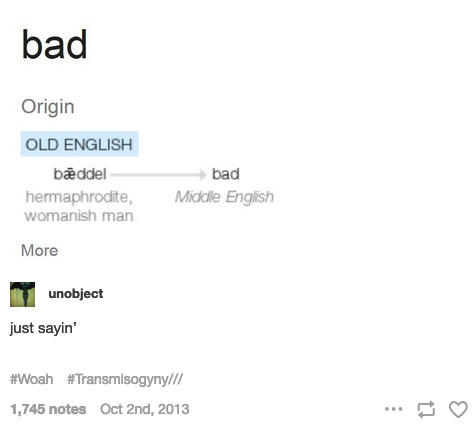
The post was quickly liked by @lezzyharpy, also one of the first to call themselves “Baeddels”.
This post first provided the name and defining ideology of the Baeddel movement. The implication of the post was, essentially, that because the root of the word “bad” was “baeddel”, and because “baeddel” referred to intersex people and “womanish men”, this old English slur was proof that transmisogyny was the worst form of bigotry; and even, perhaps, the root of all bigotry. (It’s worth noting that this interpretation of the etymology has been problematized.)
While @unobject was the first person to make this connection, @autogynephile (“Eve”) eventually became, in essence, the figurehead of the movement. Of the other Baeddels, some of them were explicitly aware and supportive of the ideology behind Baeddelism, some of them were young or newly-out trans women seduced by the personalities involved, and some of them were tangential enough to the movement that their understanding of it was wholly different from the understanding those at the core of the movement held and promoted. Baeddelism was a sort of trend, for a time, and many participants wore the name without entirely knowing what it meant.
It’s important to acknowledge that as much as there were dedicated members of Baeddelism, and as much as there was a unified ideology behind it, there were also individual Baeddels who did not understand — let alone support — the ideology.
The Ideology
Baeddels essentially built upon the foundation of @monetizeyourcat’s ideology that had been gaining traction on Tumblr in the years prior, with some additions that ultimately defined their movement:
Transmisogyny is the form of oppression from which all (or most) other forms of oppression stem.
Privilege is granted on the basis of assigned sex. (“AFAB” or “Assigned Female at Birth” vs. “AMAB” or “Assigned Male at Birth”)
These fundamentals of Baeddelism were essentially a rebranded form of Radical Feminism. In particular, they drew from the Radical Feminist idea that misogyny was the “primary” form of oppression; that which all other oppression stemmed from. Baeddels only tweaked this idea to replace “misogyny” with “transmisogyny”, which led to the rest of the conclusions Baeddels drew:
There is no “transphobia”
All “transphobia” stems from transmisogyny first, and transphobia as it impacts non-trans-women (or, sometimes, non-transfeminine people) is incidental.
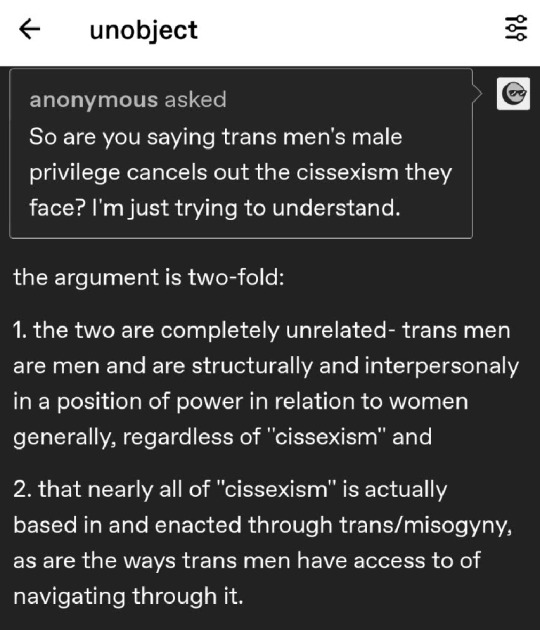
There is no “Trans”
If “transphobia” isn’t real, what else is left of the transgender identity?

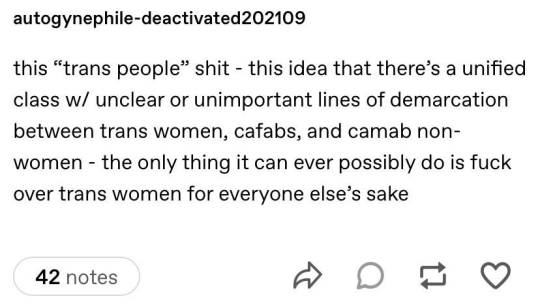
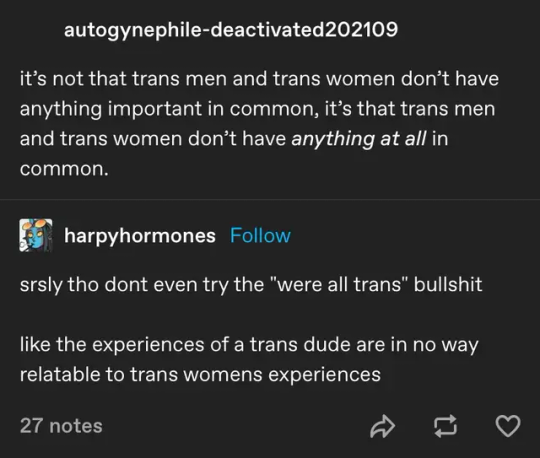
While this is by no means the dominant understanding of transgender identity or community, the equivocation of oppression to identity is, in many ways, core to Baeddel ideology (and we see the lasting impact of this in still-widely-used “TME/TMA” termingology). By this logic, if transphobia doesn’t exist, neither does trans identity or trans community (though they obviously believed that transmisogyny, and subsequently trans women, do). Therefore, there are no “trans men”, and belief in the existence of “nonbinary people” is highly contingent on whether an individual believes in the oppression of nonbinary people.
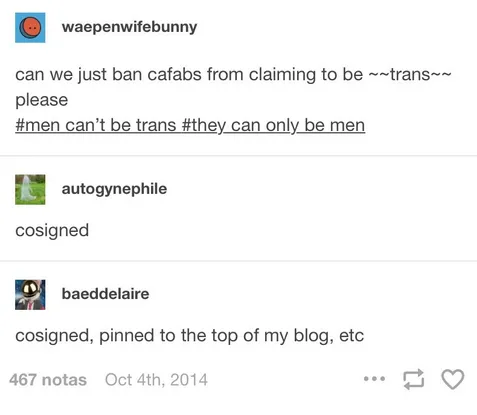
“AFAB Privilege”
The idea that within the queer and/or trans community, people who were AFAB/CAFAB (Assigned Female At Birth) receive unique privilege and positions of power that people who were AMAB/CAMAB (Assigned Male at Birth, a counterpart to “AFAB” and “CAFAB”) do not.

Trans Lesbian Separatism
… was what the movement was ultimately defined by, as the logical conclusion of their other beliefs (much like Lesbian Separatism was the logical conclusion of Radical Feminist beliefs).
Baeddels believed that only trans women can understand, or be truly safe for, other trans women; therefore, contact with anyone who was not a trans woman was deemed “dangerous” and highly discouraged.

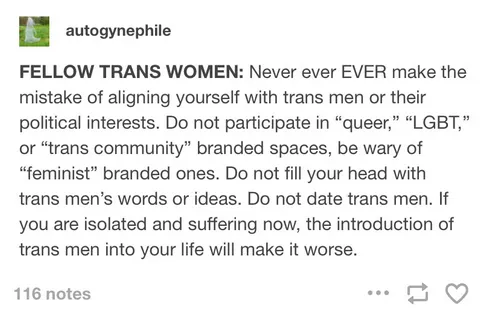
Trans Men
… also played an important role in Baeddel ideology, and the resulting treatment of trans men is what is often remembered today. Baeddels generally believed the following, either explicitly or implictly:
Trans men are not oppressed, or experience so little oppression that it hardly matters.
Trans men do not experience misogyny, even prior to transition.
Trans men have access to male privilege, or trans men have an easier time passing, and frequently go “stealth”; thus benefiting from male privilege as well as cis privilege.
Trans men are often (or always) misogynistic and transmisogynistic, and are not held accountable for this.
Trans men oppress cis women.
Trans women enacting violence on trans men is “punching up” at oppressors, and therefore not only permitted, but encouraged.
Trans men are inherently violent, or become aggressive and violent when they go on testosterone HRT (Hormone Replacement Therapy)
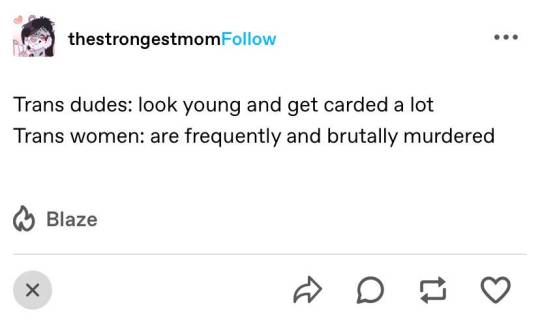



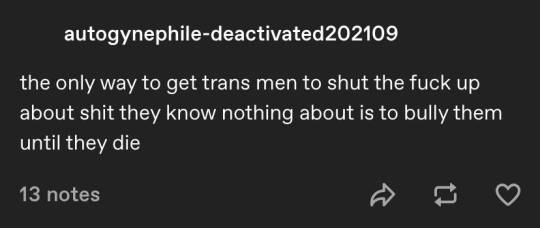

The impact of this ideology is often discussed among transmasculine people because of the depth of harm it caused, directly and indirectly — and it was very much intended to. Harm caused to transmascs was not only permitted or excused, it was often actively celebrated.
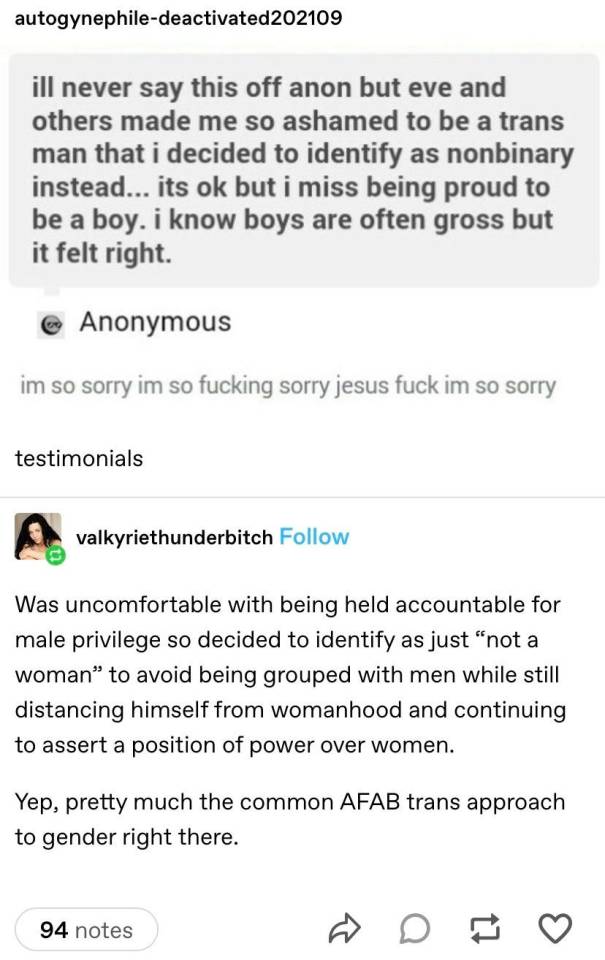
Nonbinary People
… are often overlooked when summarizing Baeddelism, but Baeddels did have plenty to say about them. Baeddel ideology relied on the idea that privilege was granted on the bases of assigned sex, and nonbinary people’s genders were thus treated as irrelevent; they essentially did not believe nonbinary people truly existed.
CAFAB nonbinary people are either trans men attempting to invade women’s spaces, or cis women pretending to be trans.
CAMAB nonbinary people are actually just trans women who haven’t accepted it yet. They must transition, or they are transmisogynistic.
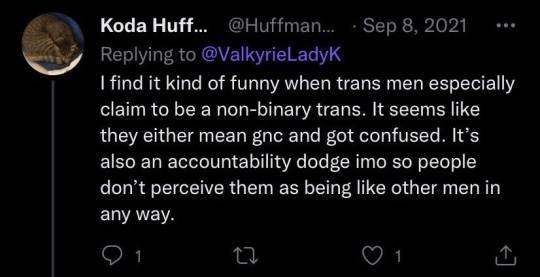
Intersex People
Intersex experiences, and intersex history, were often co-opted and erased by Baeddelism. This was often more a byproduct of their beliefs than an overtly-stated idea, but most notably, the term “Baeddel” itself is likely more applicable- if not exclusively applicable- to intersex people, rather than trans women. Making their reclamation of it as a “transmisogynistic slur”, or their claim that the word’s existence means that “transmisogyny is the root of all oppression”, incredibly ignorant- if not actively harmful misinformation.
Notably, Baeddels also believed that intersex people- being “more androgynous” (a harmful misonception)- were able to pass more easily as the opposite assigned sex, and that intersex people (even within transfemme spaces) had “intersex privilege”. Some even believed, and openly claimed, that intersex people were “hermaphroditic”; a slur against intersex people, and typically implying that the individual has both sets of reproductive systems simultaneously.
Trans Women
… did not receive universally positive treatment, either. Baeddelism was very much a cult-like group built around the firmly-held conviction that they were absolutely correct, and that anyone who disagreed with them was The Enemy. Trans women who disagreed with them were generally seen as brainwashed and self-hating, and trans women who did agree with them were expected to subjugate themselves to the ringleaders of the movement.
Within Baeddel circles, trans women were most frequently victimized by the abusers allowed to run rampant because “trans women do not, and cannot, harm anyone else.” — including, apparently, each other.
“They were also bad shitty abusive people in general. “… a bunch of them passed around a pile of smear campaigns and false rumors about virtually any trans woman that they had a even the slightest animosity for. Including the victim of the kinkster rapist. They’ve done other fucked stuff, like chased two twoc off this site for trying to make a zine, but yeah. That’s like, just some of it. I’m not up for going over the messy details of the whole shitparade. “Full disclosure, I made a lot of excuses for these sacks of crap, even while they were out there spreading false crap about me […] I wasn’t aware of the worst shit they were doing until much much later.” - @punlich
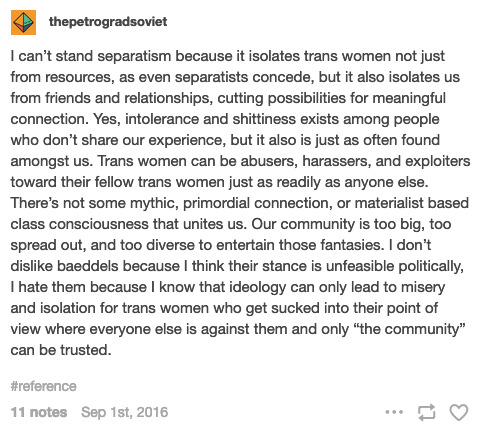
Inside the Movement
Though individual Baeddels often existed in vastly different social circles from each other- particularly offline- those who lived through the movement highlight commonalities in their experiences.
One interviewee recounts the manipulation present in their initial involvement with the movement:
“It came to me at a point where I was very quick to weaponize anything anyone told me about their experiences, because I was always a fighter. I’ve been an activist for a long time, you know, and when these trans women would come to me with their experiences I would believe them. I wanted to. But the way they acted didn’t add up when compared to what they were saying. I felt really lonely there, and stupid all the time. I felt like I was being a bad trans person.” […] “Online they were more willing to say things that were, for lack of a better word, stupid. They would say things that lacked any kind of logical sense. But in person, they would go into this kind of toxic femininity- this weaponization of weakness. And I think that’s because online they were often in these echochambers, but in person they had to rely on much more subtle manipulation.” - Vera
It seems at points that the environment created within this movement- and the social circles that composed it- was almost cult-like in nature and in need for control.
“It was very isolating. I didn’t see my friends for a while, I was kind of just living with them, cooking and cleaning for them, starving myself, and slowly growing crazy. I was just being consumed by this weird academia and theory that had no basis, because everything was online and Tumblr-based.” - Vera
Perhaps most chilling, however, are the patterns in their attitudes toward sexual assault. One interviewer recounts being subject to sexual assault, and upon posting about their experience to a Facebook group, being met with hostility from Baeddels present in the group- who quickly used their social influence to have them banned from some of their only support systems at the time.
“I ended up with pretty much no one to talk to about the experience at a time when I was already really, really struggling, and it’s one of several factors that led to me dropping out. “The Baeddel who got me banned also messaged me directly at some point during all of this, and I tried to get her to understand the pain she was causing me. She basically laughed it offand said it was my fault. She seemed to find a lot of joy in how much it hurt me, and blocked me soon after.” - Anonymous
Another recounts sexual consent violations from a friend-turned-Baeddel:
“[My ex-friend] had previously been fetish-mining me for her mommy kink. I was freshly estranged from my own mum, and she stepped in to be like, “I’m your new mum now,” and would pester me to call her “mum” in Welsh- as at that point she was going by a Welsh name. I played along, but it transpired that she was basically using that to get off, and she had a thing for infantilising transmascs and being this mum/mom figure.” - Luke
And yet another interviewee discusses verbal sexual harassment during interactions with another Baeddel:
“I had one [Baeddel] directly tell me that I’m beneath her as a trans man, and that I should “Shut my smelly cooch up” and only use my voice to uplift trans women. I was a minor at the time. “She then sicced her followers on me, and they bombarded me with messages telling me I’d “never be a real man”, that I needed to “sit on the side and allow them to have the spotlight”, and even telling me to kill myself- because I was inherently toxic to them. I was 16 years old, pre everything, and I couldn’t even pass at the time. They didn’t seem to care that I was a minor, or a newly hatched egg.” - Anonymous
While Baeddel ideology itself does not explicitly condone or excuse sexual assault, it’s striking how common these stories are; especially considering how small in numbers actual Baeddels were.
It was, in fact, this exact problem that would eventually cause the movement to dissolve.
The Downfall of Baeddelism
Sometime between the group’s formation in 2013 and their downfall near the end of 2014, @autogynephile (also “Eve”), the defacto “ringleader” of the Baeddel movement, began what Baeddels referred to as a “transbian safehouse”.
This was apparently intended as a place for unhoused trans woman lesbians and trans women who, in general, had sworn off contact with men; the ultimate goal of the lesbian separatist ideology at the core of the Baeddel movement. It was thus also referred to as a “commune” by some, and as a “cult” by others.
One occupant of the “safehouse”- Elle- later posted to Tumblr that they had been raped by Eve during their stay, and detailed their experiences.
The Baeddels, rather than believing the victim and ousting the rapist from their movement, chose to close ranks around Eve instead.
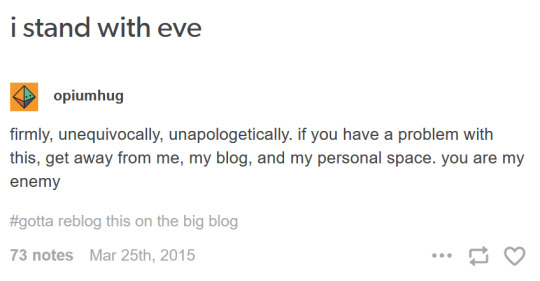
Various reasons were given for this:
The victim must be lying
The victim- and anyone who believed them- was simply transmisogynistic.
Anyone who disagrees with the Baeddels is an Enemy Of The Movement, a “carceral thinker”, and a danger to trans women as a whole.
Trans women are incapable of sexually abusing anyone.
“Standing with Eve” was the ultimate sign of loyalty to the movement, and thus a mark of pride and honor.
It was okay to keep being a Baeddel no matter what, because Rape Accusations Should Be A Personal Matter.
(You can read more about Eve’s own denial of these events here and here.)
Years later, even people involved in the initial group have spoken out against the movement and actions of those involved:
“I was in ~the Baeddels~ for years and like… we straight up did horrible shit. “We harassed anyone that disagreed for any reason, our politics were terrible, our isolationism made an environmental ripe for abuse that I have firsthand experience of, there is nothing in that group worth salvaging or defending. “Also acting like people are just bringing this up out of the blue is silly like… it’s being brought up because people are still trying to defend the shit we did instead of fucking recognizing that it was wrong. “Creating this myth that hate on the Baeddels is just a way of keeping trans women in line is a tacit defense of the horrid shit we did.” - @lezzyharpy
“like I’m sorry but I served my time in shitty awful Baeddel group in early mid 2012s and it fucking sucked ass.” “… Like it’s straight up cult-like the way you build this self-reinforcing network wherein ayone on the outside looking in with any criticism is unsafe, not to be trusted, only there to hurt trans women, and the only people you can trust is this self-selected group of trans women.” - @lezzyharpy
Why It Matters, and Why Baeddelism Never Really Fell
Baeddelism itself has seen multiple attempts at resurgences by various individuals, including documented experiences with self-proclaimed Baeddels as recently as 2018- well after the movement first “fell” in 2014.
Most proponents of “Baeddelism 2.0”, a revival of the original movement, argue that the abuse that occurred within the original movement was either completely fabricated by detractors (sound familiar?) or, at minimum, not actually inherent to the ideology.
And, of course, there are some original Baeddels still active on Tumblr today.
Baeddelism never actually went away.
“Baeddelism” was only one name for a set of beliefs that existed long before the specific term did, and hasn’t gone anywhere since the original Baeddel movement died down.
What the Baeddels did was put a name to the ideology @monetizeyourcat was cultivating before them, and what Cat did was popularize, centralize, and justify a way of thinking that had existed before she ever made her blog.
This ideology has since been referred to, loosely, as “TIRF-ism”: Trans-Inclusive Radical Feminism.
It is rare that anyone actually refers to themselves as a “TIRF”, and there is no real centralized TIRF movement; rather, a loose collection of radical feminist beliefs circulates various transgender spaces. The validity of these beliefs is generally taken for granted: of course (trans) women are The Most Oppressed People; of course (trans) women are Inherently and Unequivocally Victims In All Situations; of course (trans) men are Inherently Oppressors; of course (trans) men are Dangerous and Evil… and so on.
Like Radical Feminism, and subsequently Trans-Exlcusive Radical Feminism (TERF-ism), those ideas are fundamentally dangerous.
The defining tenants of radical feminism are that misogyny is the root of all oppression, and that rather than misogyny being an issue of power and control on a society-wide level, it is instead, or also, a matter of oppression and privilege on an individual level: men are always oppressors, and women are always victims.
These beliefs fundamentally exclude and erase the experiences of other marginalized people.
Namely, people of color and indigenous people, who’s experiences with and concepts of gender do not fall within the strict and rigid lines that white, western, colonialist people’s do.
Radical feminism is not a redeemable ideology. It cannot be reshaped into something good. It is fundamentally broken, and the movements born from it- lesbian separatism, political lesbianism, TERF-ism, TIRF-ism, and Baeddelism- are proof enough of that. They each promote only surface-level variations of what is fundamentally cult-like thinking: only the in-group can be victimized. Only the in-group is safe; the out-group is inherently and universally dangerous. Only the in-group understands you. All members of the in-group are, fundamentally, incapable of abuse.
We cannot allow these ideas to be perpetuated within or without the trans community.
Learn the Signs & Prevent Harm

Here’s what we can do to prevent this from happening again:
Learn what Baeddel ideology and TIRFism look like, even detached from the name.
Learn what radical feminism looks like, even detached from the name. Even from people who claim to oppose radical feminism.
Act on dogwhistles. Call them what they are.
Do not allow people to downplay the harm all forms of Radical Feminism have caused. Remind each other that Radical Feminism is not a redeemable ideology, and seek out other branches of feminism instead.
Remember the harm that has been caused. Remember that it will be caused again if these things are allowed to go unchecked.
Listen to and uplift marginalized people. Allow them to speak to their own experiences, identify their own needs, and name their own oppression.
Remember who the real oppressors are, and do not pit marginalized people against each other. The people perpetuating and benefiting from transphobia are cis people- and more specifically, cis people in power.
Build solidarity with other marginalized people. One group of trans people cannot gain liberation without liberating all trans people, and one group of trans people cannot be targeted without the rest of us suffering as well.
Remember that there is no group or identity incapable of enacting abuse, violence, harassment, or other harm against another. Victimhood should not be determined based solely on an individual’s identity.
Remember that there are no acceptable targets for violence, cruelty, harassment, and abuse.
For more context and a list of red flags, read the rest of the article here:
#baeddelism#baeddel#baeddels#transgender#transunity#transmasc#transandrophobia#transfem#nonbinary#non bianry#transphobia
1K notes
·
View notes
Text
you are a roman senator, and one of your fellow senators just called you effeminate! what to do?
well, first you have to find out: how effeminate are you, really? take this test to find out!
do you:
like to wear the colors yellow, bright green, light blue, purple, or lavender: +1 for each
like to wear long sleeves: +1
enjoy the company of women: +1
like to wear perfume: +1
curl or style your hair: +1
shave any area of your body (other than your face and/or head) +1
move carefully in order to not mess up your outfit/hair/makeup: +1
wear a loose belt, or no belt: +1
like to wear loose fitting clothing: +1
have a lot of casual sex: +1
ever bottom in sexual encounters: +5
love your wife and are open about it: +1
like to wear translucent fabrics, or silk: +1 for each
wear your tunic longer than knee length: +1
wear more than one or two rings: +1
wear other jewelry (earrings, necklaces etc): +1
wear makeup: +1
have a complex and flamboyant oratorial style: +1
have long hair: +1
like to wear slippers: +1
enjoy living luxuriously: +1
have little impulse control: +1
once you have your total number, match it to these results!
0-4: you are a proper, virtuous roman man. only your political enemies would call you effeminate, and they do that to everyone. even if you scored a couple of points, most people understand that nobody is perfect.
5-10: you're getting into some dangerous territory here... you'd better watch out or your fellow senators will ridicule you for your womanish ways.
11-20: you are effeminate. all the other senators are definitely making fun of you. they're glancing at you, whispering in each others' ears and giggling as you walk in there with your little perfumed hairdo, or your fancy little outfit, or whatever got you a score this high.
21-25: “For one who daily perfumes himself and dresses before a mirror, whose eyebrows are trimmed, who walks abroad with beard plucked out and thighs made smooth, who at banquets, though a young man, has reclined in a long-sleeved tunic on the inner side of the couch with a lover, who is fond not only of wine but of men—does anyone doubt that he does what cinaedi commonly do?" *
26-31: you may as well just embrace it at this point. no one can dampen your effeminate swag if you just don't care what they think! you can even feel proud that you got the high score.
if you want to read more, this is a pretty good article that covers a lot of this stuff: https://www.jstor.org/stable/24616489
*(Gellius, Noctes Atticae 6.12.5, tr. J.C. Rolfe)
#i did it. finally a roman am i gay test#also if i missed anything significant comment on this and ill add it....
420 notes
·
View notes
Note
im curious about your thoughts, would you talk a little about the theme of gender in the terror? i just enjoy your perspective!
okay i can't promise you the properly formatted essay with footnotes and citations i would love to write given the time and energy, but sure, i'd love to. because the theme of gender is central to the terror, particularly regarding the victorian ideal of masculinity, as a part of the greater overarching narrative theme of social constructions and structures being stripped away, and what and who remains after (crozier even explicitly remarks to fitzjames at the beginning of episode 7 that the remains of their civilization which they're clinging to for a sense of comfort and stability will begin to 'fall and drop away' as they travel further). we see this not just in the case of fitzjames, whose national identity and sense of selfhood we're given some insight into through the lens of gender, both with the iconic dress scene and his subsequent choice to dress as britannia, the feminine symbol of british imperial power, for carnivale - a juxtaposition which emphasizes the contrast between his private and public personas, and between the moment of vulnerability and honest self-expression in the scene where he holds up the dress and smiles at his reflection, and the ironic mask he dons for carnivale as a shield to conceal his doubts and insecurities, and any 'shameful' desires he might have - but also, for example, in the case of collins, who in the same episode seeks out goodsir, whose emotional availability and honesty have earned him the derision of his crewmates in the forms of scornful looks and derogatory comments denouncing his mannerisms as 'womanish' and thus shameful, but which only become increasingly necessary and shared amongst more of the men as they're forced to rely more and more on one another for support, and societal expectations of how they should conduct themselves become increasingly irrelevant, their fragility exposed and found wanting. collins is rebuffed and reprimanded by dr. stanley in episode 6, who dismisses his emotional distress, but in the following episode with goodsir he's encouraged to confide in him and, upon doing so, breaks down in tears and shares a desperate hug with him in full view of their camp; actions which would have been confined to privacy if they were allowed to be expressed at all earlier on. everywhere, cracks are beginning to show in this ideal construct of masculinity that the men were once expected and so proud to uphold.
silna's presence also highlights the themes of gender, and how they intersect with race and ethnicity; she is almost exclusively referred to as a 'girl' by the men of the expedition despite clearly being both a grown women and far more competent at surviving in the arctic than they are. the empire and its subjects' unwillingness to accept that someone who is both a native to the region and a woman could be more knowledgeable and better equipped than they are to deal with the situation leads them to assert their perceived superiority through how they address and refer to her, using the infantilizing language of 'girl', which although i believe the use of was more common in victorian england than it was today, nonetheless carries these implications, particularly when it's almost exclusively the only term they use to describe her. even those men who are more open to accepting the need to rely on the knowledge and support of the indigenous peoples of the region in order to survive there, such as crozier, don't begin to realize this until it's already too late. we also see the weaponization of femininity as a badge of shame of weakness with, as aforementioned, goodsir, and with hickey when he says to gibson that he "was such a good wife to me all these months" in order to get under his skin after gibson declares their relationship to be over.
we also see this victorian ideal of masculinity physically begin to 'fall away' as the men's bodies and minds deteriorate due to the extreme conditions they find themselves in. as sickness and despair set in, the men are no longer physically able to uphold this construction they've been told their whole lives it is vitally important that they strive to maintain in all their undertakings, further compounding the horror of their experience, but also liberating them. hickey again takes advantage of this, too, demonstrating his intelligence and quick, pragmatic thinking when he castrates irving's corpse after murdering him in order to threaten the remaining shreds of the men's masculinity and inflame them into rash, reactive action. and fitzjames comes full circle in his own gender-influenced narrative when he confesses his long-carried shame to crozier, finally unburdening himself of the idea of 'james fitzjames' that he built on the foundations of that masculine ideal the society he lived in values so highly and as a result is able to let himself lean on a fellow man for support and shed tears for the first time (that we see onscreen at least), and when he asks crozier to euthanize him to help him out of his suffering in his final moments - both poison and suicide have traditionally earned a reputation as means used by 'women and cowards' to escape the brutal reality of death, but they allow fitzjames to die with as much dignity and the least amount of suffering as the at that point truly desperate circumstances allow, and far more than the more ideally masculine, imperial british glory he once aspired to of death in combat or without any medical assistance to ease his passing would have.
#WHEW#posts all this then goes back to feminizing that man (james fitzjames) and dressing her in outfits#the terror#long post#suicide mention
385 notes
·
View notes
Text
Knot That Bad
I've a bit of a theory that the end of 1.01's 2008 minisode is actually foreshadowing S3 and how the story ends.
The exchange I'm talking about:
Aziraphale: Well, I'll be damned.

Crowley: *wink* It's not that bad when you get used to it.

This exchange is humorous innuendo on one level. On another, though, it can be read as the characters not knowing quite how correct they are about their story to come and a lot of stories-- particularly, those that are well-plotted, as this one is-- have their endings imbedded near their beginnings.
To see where I'm going with this, you'll need to know that the word bad comes from the Old German baeddel, which meant-- in the phrasing of the time-- "a womanish man." It's an example of linguistic oppression of people who do not fit neatly into societies with a binary view of gender, as it evolved, as we know, to mean wicked and like things.
In modern times, though, bad has been somewhat unintentionally reclaimed by way of people also using the word to mean positive things, even if most do not know they are reclaiming the language in doing so. Crowley seems to love the word as he uses it as self-descriptive twice in the 2008 minisode, both times while flirting with Aziraphale.
So, the bad in question in Crowley's line here is actually also himself:

The joke in here is that Crowley is also saying: knot that bad.
In one way, it's the first of about a dozen scenes in the series referencing Crowley's yen for being tied up. In another way, a knot is also a nautical mile and, in another scene or two later on, it sounds like knot is also being used by these fish-and-the-sea-obsessed two just as general slang for fucking as well. Given Crowley's very happy with his funny and smutty wordplay smile and wink in this scene, it's those connotations he's likely meaning in this 2008 scene.
It's just that there's also a third way to take all of this and that's where the S3 ending foreshadowing comes in:
Aziraphale: "Well, I'll be damned."

Foreshadowing that Aziraphale falls, which would, based on what we've seen since, have to be the end of S2 and that's the kickoff of S3, but...
Crowley: "It's knot that bad when you get used to it."
...by the end of it, Aziraphale knots that bad-- as in, the wedlock slang of tie the knot.
He marries Crowley.

#good omens#ineffable husbands#crowley#aziraphale#aziracrow#good omens meta#good omens theory#crowley x aziraphale#ineffable husbands speak#etymology#good omens speculation
53 notes
·
View notes
Text
Romeo and Juliet’s Instalove Makes Sense, Actually: A Very Hot Take
So a big chunk of R&J clownery I constantly eat on this blog is the neverending bitching about R&J falling in love at first sight is unrealistic and based on lust because they don’t even know each other and how William Shakespeare totes meant it as satire and blah, blah, blah. Needless to say, love at first sight/instalove was a very popular trope in Shakespeare’s time, and Shakespeare himself used it constantly in his other plays. Occam’s Razor: He liked it. Also, er, it is very much a real-life phenomenon. If perhaps overrepresented in fiction.
But anti whinging aside, it does beg the question: What did attract R&J to each other in the first place? I’ve talked at length about their similarities and their compatibility personally, verbally, and socially, but the bulk of the evidence is largely after they have met. So it makes sense why R&J would stick together and even prefer shuffling off their mortal coil than not be together. But at first sight? Without knowing a thing about each other besides their appearances?
R&J obviously do value physical beauty, but that in and of itself doesn’t explain why they would be attracted to each other. Shakespeare makes it a point to tell us that Capulet invited all the hot women in Verona, including Romeo’s crush, Rosaline. Why didn’t Romeo fall for any of them, or simply pine for Rosaline from afar? Juliet was dancing with a knight when Romeo saw her, and there were at least boys her age and not related to her, including Mercutio and Benvolio. Why didn’t she prefer any of them? And then there is the underrated fact that they met during a masquerade ball at night.
My very hot take? Shakespeare kept the instalove of his source material because his R&J would, in fact, fall 100% in love with each other for reasons other than hotness, and it is plausible that they would do so. And I’ll prove it: through Y/N dynamics.
Romeo’s POV
You’re the son and heir of a lord, living in 15th century Italy. Good news—you got male privilege! You have been given a fine education (for the time) in Latin, Greek, rhetoric, and so forth. You know how to read and write and duel people with pointy sticks. You have been raised to lead, and thus people are predisposed to take you seriously. You can do whatever the fuck you want with whoever the fuck you want, within reason. So long as you conform to this role and not show any unruly womanish traits, you’re good to go.
That said, you live in a macho society that is 100% okay with killing other people with sharp pointy sticks because they said something rude to you. Not only that, but your family has revived a blood feud with another family who hate your guts. Hence, your chance of dying a bloody death is astronomically high. Despite this, you turn out to be a pretty cool and even-tempered guy—you don’t cause trouble in the slightest. Your dad’s enemy even acknowledges your sterling reputation as a “portly gentlemen” and a “well-governed youth.”
In fact, you’re so chill that your biggest problem is that this hot girl you like doesn’t like you back. Even worse, she refuses to have sex, period. Which means she won’t have sex with you. You are a teenage boy, and this is indeed the worst thing that has ever happened to you. Fuck your life.
That said…you are not really doing much to get Hot Chick Who Won’t Have Sex With You to change her mind about you sex, are you? All you’ve been doing so far is 1) sneaking off to weep beneath sycamore trees in the early morning and 2) bitching to the Friar about HCWWHS, and 3) bitching to your cousin about how HCWWHS won’t spread her thighs to receive your that sweet golden cum (yes, that is verbatim). And when you find out that HCWWHS is going to this party at your enemy’s house, you don’t exactly jump at the chance to see her, do you? Your cousin literally has to convince you to go. Your response? “Fine, but I won’t Like(tm) it.”
Sure enough, you don’t. In fact, halfway through, you tell your friends you want to turn around and go back home. Nah, you say. It’s not worth it. You had a dream/premonition and now the party has bad vibes. (HCWWHS who? Ngl, you kind of just forget about her). Your cool friend mocks you for taking a ~dream seriously, ffs, but honestly you don’t pay much attention to him. You decide to go anyway, not because of HCWWHS or your cool friend, but because you march to the beat of your own drum. Que será será.
So what do you really want out of romance? Clearly, you are interested in HCWWHS’s thighs, but not much else about her. Why are you so emo about her, then? Certainly, she’s smart and hot, per you. Possibly older. Perhaps you feel that being with a hot older chick who can smell horny teenage guy BS a mile away is exactly what you want, actually. Or what you think you want.
Because here’s the deal: You’re obviously an odd duck in this hateful medieval town. You’re too chill for this feud life, too smart to get into needless fights, too young to work (don’t have to), and too old for school (you had private tutors, but that was ages ago). You’re too young to shoulder the responsibilities of an heir, but too old to be kept at home. So what tf do you do? See a play???? Do archery???? Falconry???? Hang out with friends????
As you can see, it’s a little lonely. Your parents are the type to let you do whatever the fuck you want because you’re a ~man now, and you need your ~space. No rules or structure. And despite what pop culture adaptations of your story have told millions, you are actually a smart and fairly mature guy for your age. You love your independence, of course, you won’t ever complain about that. But independence alone does not equate to true freedom.
What you need (but you don’t know you do) is a girl who would, actually, ask things from you. Demand them, even. Someone who is not shy about telling you what she thinks and what she wants. Someone who is open to the idea of love and not be obsessed with either chaste perfection or violence. Someone whom you can relate the struggles of living this isolated, feud-stricken life to. Someone who is mature but closer to your own age. Someone who is about as ambivalent as you are about the status quo.
And then you see this beautiful, mature, sad-looking girl dancing with this random knight. Oh, you think. Oh, indeed.
Juliet’s POV
You are a young teenage girl living in 15th century Italy. Bad news—you’re fucked. So much so it’s honestly too depressing to relate here in its entirety. You yourself know it, very deep down. Some light in this darkness? You are the only daughter to a very rich and noble family. Does that make you better? It should, a little.
For one thing, you are protected from your very violent macho culture’s obsession with killing people with pointy sticks. You are a girl, and you don’t do that. Your only jobs are to learn to read, sew, and marry rich. Your parents are not what you’d call the progressive types. Your relationship with your mother is very formal and awkward; needless to say, she is not the warm, motherly type. That would be your Nurse, who was actually the one to raise you. Your father is fine until you contradict him even slightly. Then he turns red and shouty and blustery, and suddenly you are a saucy girl and his fingers start to itch.
Fortunately for you, you’re a good girl. Not only that, but you are a smart one. From a very early age, you have learned how to survive in this very dysfunctional family. You learn how to say the right things in the right way. You equivocate better than any lawyer. Through trial and error, you become an excellent liar. (Either that or your family is just too dumb to believe you could ever lie to them). But even this sucks, because plot twist: You dislike lying. So much so that most of your “lies” are really just truths cleverly edited into the PR speak your family will accept.
At the same time, though, your Nurse indulges you and has no filter. So you learn a lot from her, especially about sex and men. Perhaps you even listen in on your cousins’ gossip. Also, you’re a 13-year-old with a growing libido. Not that you think you will ever get laid, lol. Your cousins will literally kill any man who tried. Your cousin Tybalt in particular loves a chance to fight. It’s not just your virtue that you need to protect, it’s the poor guy too.
But you are still 13, so when your mother and Nurse start talking about this Count Paris who wants to marry you, your instinct is to shut down entirely. You keep your mouth shut and tell them what they want to hear to appease them. It works—now you can go back to your teen girl life in relative peace.
Except no. You actually do have to meet and most likely dance with Count Paris at your family’s party. Do you want to go? Not particularly, but you are the Heir of Capulet(tm), so refusing is not an option. Do you like dancing? Maybe, but it’s hard to let loose and shake that thang with your family and cousins around. Are you interested in marriage? Nah. Your parents are proof número uno that it is not something to look forward to. Nothing against marriage, but you feel it’s something for the very distant future.
So there you are, inwardly seething inside, perhaps having to dance with Count Paris and other men way older than you, surrounded by your family. At this point, you’re exhausted and want the night to be over already. All you what to do is sulk against the wall next to some torches, looking bored/pissed/depressed. And not dance.
And then you see a beautiful boy leaning against the wall next to some torches, looking bored/pissed/depressed. And not dancing. Oh, you think. Oh, indeed.
In Sum
So yeah. Dramatic necessity aside, R&J being instantly attracted to each other makes sense, actually. They’re both introverted/in a blah mood/reluctant to attend this party, both have ambivalent feelings towards their supposed love interests (Rosaline, Paris), and both just don’t seem to fit into Verona’s feud life as neatly as outward appearances would suggest.
They see what they actually need in each other, which is balance: Juliet has too little freedom and Romeo too much. And considering how much we find out they are alike personally, there is even a sense of recognition in their first meeting. Beyond the “bewitchèd by the charm of looks,” R&J had reasons for them falling in love.
#romeo and juliet#rj meta#r&j meta#not me writing y/n fanfic in the guise of meta#canon-compliant tho#yeah the more i think about it the more it makes sense#there is also the chemistry aspect#shakespeare obviously intended r&j to have chemistry
27 notes
·
View notes
Text
with a script written by lesbian feminist activist rita mae brown as a parody of slasher films, repurposed by male producers as a straight slasher, and chosen by amy jones for her directorial debut, the slumber party massacre (1982) is an interesting film. it nominally clings to the lowest-common-denominator trope of slasher films, an analogy-clad rape fantasy with extended voyeuristic shots of undressing high school seniors and a powerfully masculine killer whose weapon (in this case, a drill) is repeatedly framed by the camera as a phallus; schoolgirls push the boundary between girlish innocence and womanish self-assurance, and as punishment for making themselves sexually available they are penetrated to death by a deranged stranger, etc, etc. these well-worn beats have been parodied practically since their invention, and yet this film makes some interesting choices within its narrative. firstly, the film makes a point of establishing the capability of its “final girls” early on, with the girls displaying casual acts physically overcoming men around them. secondly, the killer’s capability is established by expanding the “victim” class from the standard demographic of eighteen years or younger. the killer’s first victim is a telephone repairwoman, a tough and independent blue-collar worker, and his third victim is the adult male neighbor who had even been implied to be a potential threat to the girls. the killer does not prey on weakness, embodied in teenage girls. he simply embodies strength. the third point of interest is the film’s emphasis on community, especially between women. naturalistic dialogue convincingly performed weaves a web of women who act not for the view of men but for the sake of their own relationships—friendly, sisterly, or mentor-student—and danger only arises when they neglect these relationships and isolate themselves away. despite these strengths, of course, the film still invests quite a lot of screentime in eye candy; and its only non-white character is used as a foil to her white peers, with her callousness and rashness contrasting their caution, wisdom, selflessness, and maturity. these harmful standards of the genre, the film seems to decide, are too key to why the audience bought tickets for them to rock the boat fighting. the slumber party massacre (1982) does not function as a parody, willingly bearing as it does the faults of the slasher genre, but it does add some layers of depth to the genre and especially its view of the victims, which i find very interesting and enjoyable
39 notes
·
View notes
Text
House arrest (1)

Summary: Lloyd is getting on your nerves and more…
Summary: Lloyd Hansen x fem!Reader
Warnings: house arrest, being locked in, arguments, Lloyd being Lloyd, misogyny, a hint of housewife kink? (Lloyd), Lloyd being a shameless horny dog, implied/a hint of oral (fem rec)
A/N: For my story Lloyd got a brother.

“Entertain me, I’m bored,” Lloyd whines. “Come on, Y/N. Don’t you have anything for me to do?”
You look up from your book, frowning as Lloyd paces back and forth. “You are experiencing cabin fever, Hansen. Stop pacing, sit down, and read a book. Or watch tv.”
“You only got womanish books. I don’t want to read about the unfulfilled desires of a lady suck my dick,” he grunts.
“Womanish, what?” you slam your book shut. “Listen. I didn’t invite you here! It’s your fault we are both under house arrest.”
“Well, shit darling. If only I knew I’ll get locked up with you.”
“Maybe you shouldn’t have stormed into my home after getting contaminated with an unknown substance,” you bite back. “I can’t believe I’m dying because of you.”
“Stop being dramatic, muffin!” he mutters. “You’re not going to die. If so, we would already feel the influence of the unknown substance.”
“Thank you, Madame Curie,” you roll your eyes. “If only you stayed away from me, Hansen. I can’t go to work. I can’t go to my yoga studio. I can’t do shit.”
“Please excuse me for being worried about my brother’s sister-in-law,” Lloyd sneers at you. “My brother was worried about your well-being.”
“You mean you wanted to get to know more about the person your brother is dating,” you growl. “I won’t tell you shit about them, Mr. I wear sunglasses even inside.”
“What? Can I not be worried about my brother marrying someone he barely knows?”
“If you know, you know, Hansen. I don’t mess with someone else’s relationship. You should do the same. Leave your brother alone. He’s in love.”
“Love-“ Lloyd makes a face. He retches and grumbles under his breath, “is for dreamer and people having their heads in the clouds. Love is a construct made up by flower shops.”
“Only as you are less romantic than a punch to the guts doesn’t mean everyone wants to stay alone and fuck their way through the masses.”
“Boring,” he grins at you. “All you do is annoying and boring. Even your food.”
“Well, then order shit from your buddies poking me with their syringes twice a day. Maybe they got better food than me,” you get up from the couch to leave the living room.
Lloyd is getting on your nerves again, and you’re sure that you’ll kill him if you must spend another minute with him in the same room.

“Eggs again. Boring,” Lloyd watches you make breakfast. For you. Not him. “Don’t you have anything more…existing?”
“Why must everything be exciting? I want eggs. If you want something else, ask one of your buddies to bring you breakfast.”
“Calm down, muffin. I’ll take the eggs. Even though, they are boring,” he plops down on one of your kitchen stools.
“I didn’t make them for you, asshat,” you point the spatula at the annoying intruder occupying your guestroom for the better of two weeks.
“Aw, I bet you’d made a cute housewife,” he hums while eyeing the eggs you place on a plate in front of you. “You’d bake and cook for your man, make him a drink, and go down on your knees to thank him for the money he brings home.”
“What the fuck is wrong with you?” you throw your orange juice in his face, scowling at the misogynistic asshole. “If not for the bunch of armed assholes parking in the van in front of my house, I’d kick you out of my house.”
“Try me, cupcake,” he snickers. “You should know that you owe me a shirt now.” Lloyd looks down at his now ruined shirt.
“You’re lucky I didn’t cut your balls off for the comment you just made. You misogynic bastard!” you storm off, cursing Lloyd's birth on your way out of the kitchen.
“She forgot her eggs.”
Lloyd grabs the plate and a fork. He sinks the fork into the eggs to feast on them. “More for me then…”

“How much longer?” you bark in the phone. You’re just done having Lloyd Hansen around. “If I lose my job I’ll make you responsible.”
You close your eyes and rub your temple.
“I already called them, cupcake. They want us to wait for at least two more weeks.”
“Fine. If I kill him, it’s your fault alone…”
“You mean if I kill you,” Lloyd grunts. “Being stuck here with you is hell. I haven’t had good food in ages. And we don’t want to talk about my dick.”
“I agree!” you snap at him. “We don’t want to talk about your dick, Hansen.”

‘Now we do the cobra pose.’
You stretch your body to get ready for your next yoga position.
“Great. That’s my favorite position,” you grumble as the instructor shows you the next position. “It’s just not the same to watch a video.”
You lie on your stomach with your hands facing forward. You keep your elbows by your side and press your hands into the ground. “Breathe Y/N, “you groan as you slowly lift your chest, head, and shoulders to create an arch in your back.
“Fuck me,” you don’t hear Lloyd sneak into the room to watch you wiggle your ass. He groans and curses as your ass is right there, on full display. “Cupcake got a juicy ass.”
He steps closer, hand reaching out to slap your cheek. Lloyd stops his hand midair. He weighs his options, eyes drifting toward his crotch. “Alright, we get something better…”
“What the fuck!” you squeak and scream as Lloyd grabs your yoga pants to rip them open. “Lloyd!”
“Fuck, I knew you are hiding a perfect little pussy underneath your ugly clothes,” he stares at your exposed pussy with darkened eyes. “Damn it, buddy. We are going on a wild ride today…”
“HANSEN!” you try to get up, but Lloyd is right behind you. He grabs your ass to keep you in place, surprising you with his strength. “WHAT? OH. God.”
You feel his mustache tickle your clit. He hums and purrs as you spread your legs a little wider. “I think I found something less boring, cupcake. Now relax and let me take care of this poor thing. I bet she didn’t get any for a long time…
>> Part 2

Tags in reblog.
#lloyd hansen#lloyd hansen x y/n#lloyd hansen x you#House arrest#lloyd x reader#lloyd hansen x reader#implied smut
345 notes
·
View notes
Text
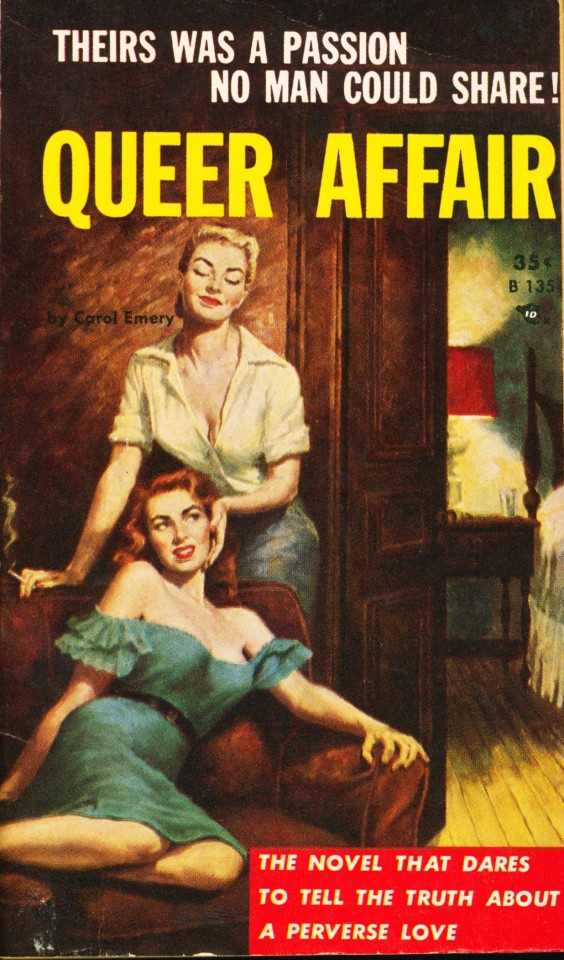
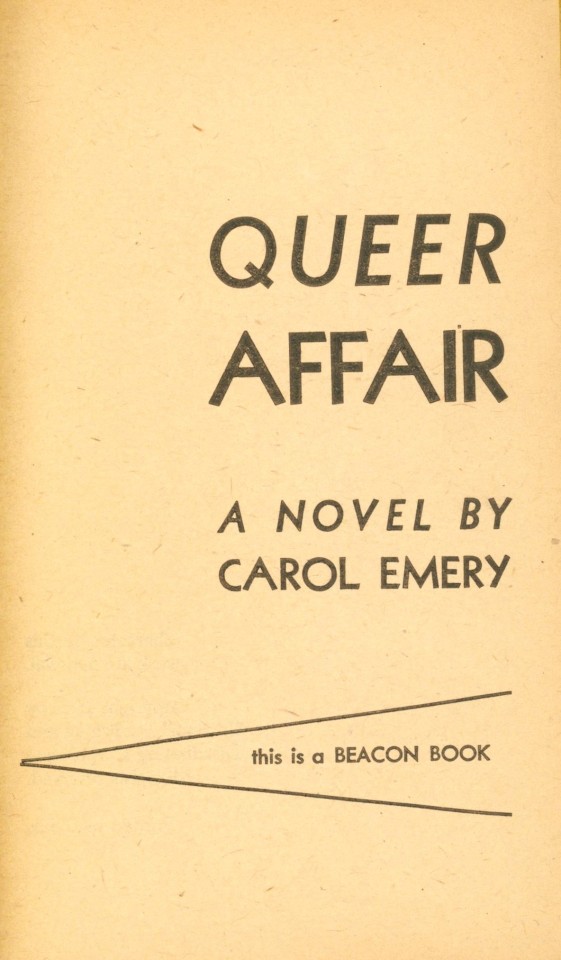
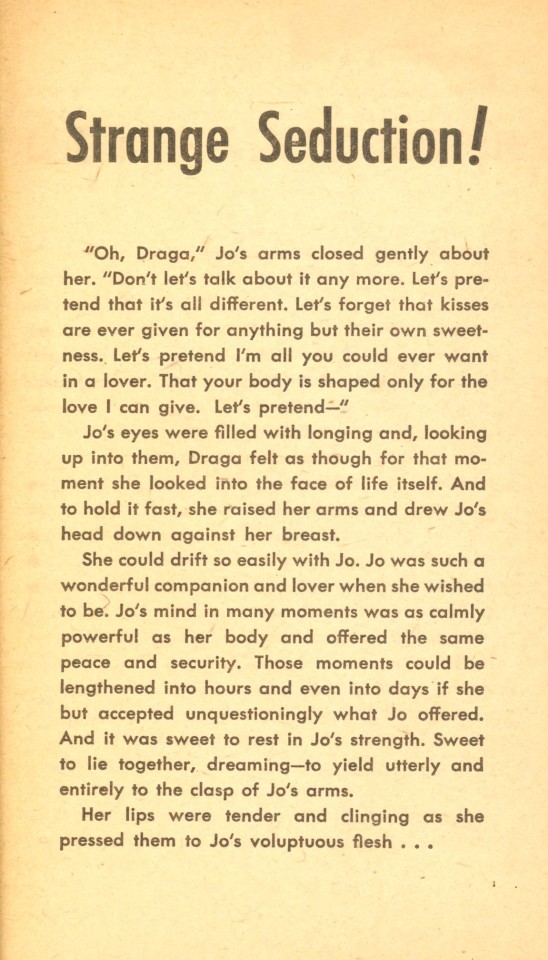
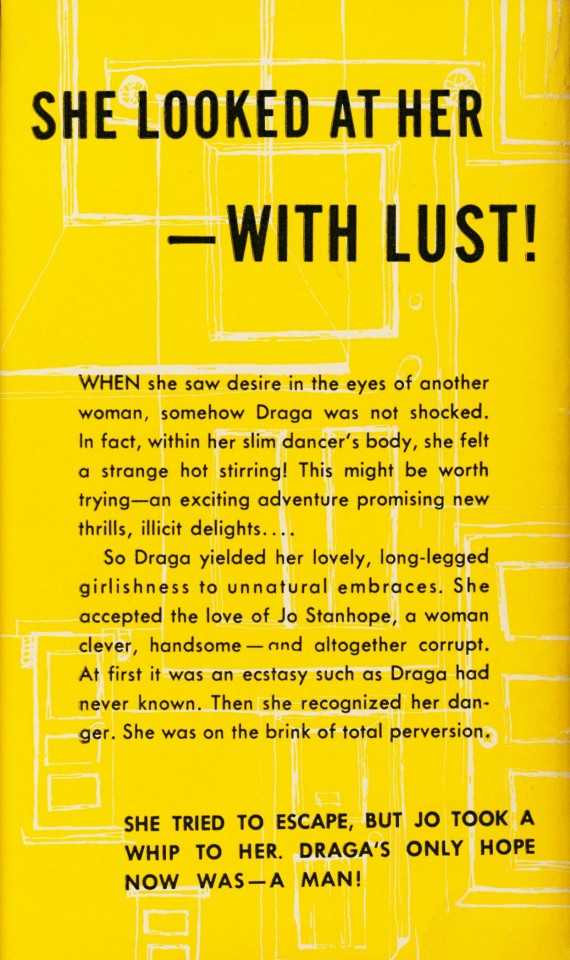
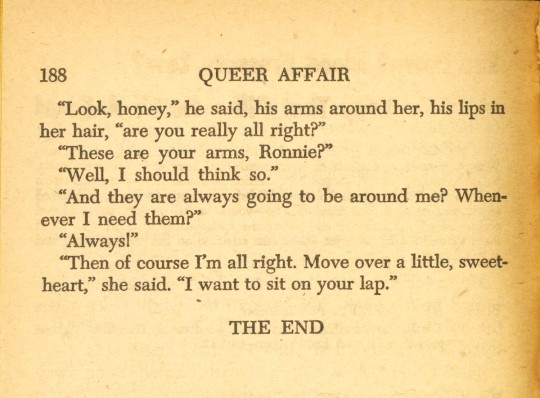
Steamy Saturday
The novel that dares to tell the truth about a perverse love.
Theirs was a love no man could share!
Draga yielded her long-legged girlishness to unnatural embraces. . . . it was an ecstasy such as Draga had never known.
Her lips were tender and clinging as she pressed them to Jo's voluptuous flesh. . . .
She was on the brink of total perversion. . . . Draga's only hope now was -- a man!
Oh, the steaminess of it all!! Carol Emory's pulp novel Queer Affair was published in New York as a Beacon Book, an imprint of Universal Publishing and Distributing Corp., in 1957, and even by today's standards, the sexual frankness of the novel is pretty steamy. Unfortunately, because it's the 1950s, a fully-realized lesbian relationship will not stand. At least one of the partners has to be off her nut (in this case, Jo), while in the end male heroes come to the rescue.
The story centers around up-and-coming dancer Draga Hamilton who is introduced to celebrity sculptor Jo Stanhope by Draga's lawyer Gilbert Young who is desperately in love with Jo. Jo, however, has other ideas, as she seduces the vulnerable Draga and they begin a torrid love affair, which, as already stated, is quite frankly narrated. Draga is head-over-heels, until of course her old flame Ronnie Marsh shows up on the scene and ruins everything for Jo.
In the end, the whole sordid love quadrangle literally devolves into a barely-suppressed S&M encounter. Jo takes her revenge on Draga's infidelity by grabbing a bullwhip that is inexplicably hung on the wall and beats Draga almost senseless with it. The whipping, however, sends both into a building sexual frenzy until both Gilbert and Ronnie come bursting through the door. Ronnie whisks Draga out of harm's way (at least as he perceives it), and Gilbert gives Jo a taste of her own whipping medicine, to which both react with this memorable passage:
Jo Stanhope looked up at him with misted eyes. "Oh, Gilbert -- you've done something for me. You've rescued me. Why, it--it was --" "Never mind," Gilbert said. "And you won't find it so bad being married to me. After all, I'm sort of womanish, you know."
Meanwhile, Draga is recovering in Ronnie's soothing arms, to which she responds, "Move over a little, sweetheart . . . I want to sit in your lap." THE END. Ugh!!
Despite Queer Affair being mentioned in several texts on early lesbian pulp novels, we could find nothing on the author Carol Emory, who we suspect is possibly a man. Nevertheless, the author makes sure early on that the reader knows Emery has done their homework on lesbianism:
Gilbert had warned her that the sculptress was a lesbian, but at the time the fact had seemed to her irrelevant. Love between women was not altogether a new and startling idea to Draga. She had read many books on the subject, including those by Radclyffe Hall and Diana Fredericks.
Appropriately, Barbara Grier, in her iconic The Lesbian in Literature, gives Queer Affair a rating of A for having "a major lesbian component but not sympathetically portrayed." While we may not know who Carol Emory is, we do know that the butch/femme cover art is by Frank Uppwall and was first painted for another pulp novel, Gutter Star by Dorine B. Clark, published in 1954, and then reissued for the cover of Queer Affair three years later.
View more posts on lesbian romance fiction.
View more LGBTQ+ posts.
View other pulp fiction posts.
#Steamy Saturday#pulp fiction#romance novels#romance fiction#lesbians#lesbian romance fiction#lesbian romance novels#lesbian pulp fiction#LGBTQ+#Carol Emery#Queer Affair#Beacon Books#Beacon Book#Universal Publishing and Distributing Corp.#Frank Uppwall#cover art#cover painting#homosexuality#UWM LGBT Collection
60 notes
·
View notes
Text
ok so the gender thing in Under Hollow Hills:
one of the mechanics is that fairy character (so most of them!) shift between "summer" and "winter" as they go along


which is to say, as you shift through moods you go through some fairly dramatic changes to shift that, including of gender (which, when it comes up, is usually described as "a game in fairyland")
which is already fun, right? invites you to mess around and give your character a shifting gender (and form in general, but i'm talking about gender)
(although to be clear, the game does include examples that stay "within" a gender. going from "girlish" to "womanish", for example, or maybe "boyish" to "boyish, sinister" (<- that one's a direct example from the text). which still invites you to go "ok, so even if my character isn't changing gender, how are they presenting differently within it." which is fun!)
but how it plays differently with humans is even more fun, i think
b/c humans in general pick one thing for each category and just kind of add nuance to it for their two states. which is already a fun thing of "they're not shifting shape with their mood all the time like faries, just undergoing more subtle changes - 'putting their loose hair up because it feels safer', for example"
but with gender stuff i feel like it's even more interesting, with that extra restriction
very easy to imagine say, a Lostling (i.e. a human who got lost and just lives with fairies now) who chooses "boyish", and being Free means he's flighty and childish and happy, while being Wary sends them to "mannish", as he take things more seriously
or maybe they choose "womanish", and Free means being a confident woman who's spent enough time here to know what she's doing, while Wary has "girlish" and that means being sent back to how she was when she got here, a scared kid who's still alive by being very careful.
or you choose "girlish" for Free and "boyish" for Wary (or vice versa!), for a trans person who embraced it after leaving the human world, but falls back on their agab a bit when they're having a not so great time. It's not fun or anything, but it feels a bit easier...
(or a similar thing but replacing the gendered one with "[gender], sexless", falling back on "no expression at all, if you can avoid it" instead of having to think too hard about it. or "[gender], androgynish" for Free and drop the androgyny for Wary, etc.)
fun choices! very easy to get something evocative out of the humans with that, i think, even if they aren't as all over the place as the fairy options.
#ttrpg#under hollow hills#ofc you could still do all that with a fairy character#but i think doing it with a character who has some attachment to human gender from. being human.#lets you play with it a bit more from some specific angles
7 notes
·
View notes
Text
… in a hopeless place
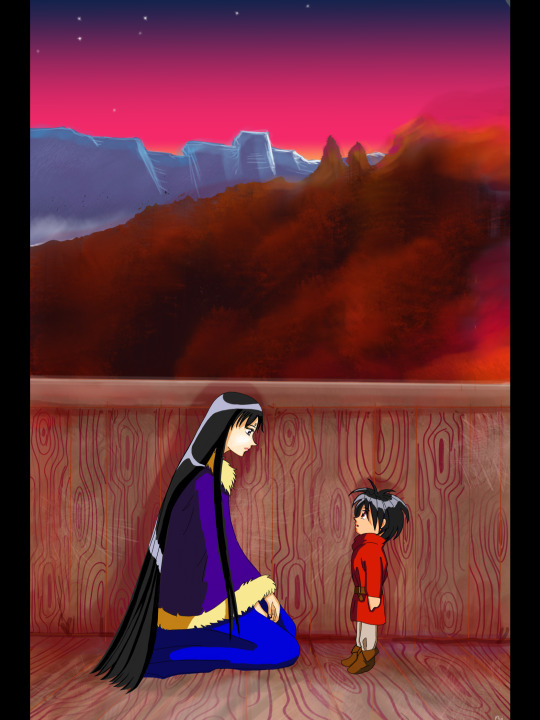
The shadows of the fighters looked like long brush strokes drawn by a restless hand on the dusty canvas of the castle courtyard. In the hazy red light of the evening sun, the master trained his student to prepare him for his great test. Their steps were quick and silent, only the singing of the swords disturbing the peace.
“Folken is good, isn’t he, Mom?”
“Yes.” Like his father, Varie thought. The dark waves of loneliness once again overwhelmed her inexorably. Using strength that she no longer possessed, she fought her way back into the here and now.
From one of the castle's countless balconies, she watched the progress of her firstborn. Her youngest son keeping her company. Mother and child were alone, only little Merle was sleeping in her bed in a room behind them. She was exhausted from raging. Once again Van - her tireless playmate - had followed her throughout the castle. Maids complained in secret about the children's wild antics, but the queen didn't care.
Little did she care about anything these days.
It was slowly becoming autumn. The world was immersed in a cheerful sea of various colors, but red was the most present. Like a harbinger of doom, the forest's crown of leaves turned crimson, as if blood were streaming down the sacred mountains of Fanelia.
The queen was shivering and the thick cloak around her shoulders did nothing to stop it.
“He will definitely be able to complete the ritual,” explained her youngest son with the confidence of childish inexperience. He reached for her hand as if he sensed her slipping toward depression. "Certainly."
Folken narrowly avoided a dangerous blow from Vargas, but the tip of his sword robbed him of a few strands of his silver hair. Varie frowned as her son was reprimanded by his master. In her opinion, they shouldn't train with real weapons. It was negligent, an accident could have happened too easily. Goau would surely have laughed at her womanish clucking...
“Mom?” Van tugged at her fingertips and with difficulty she tore her worried gaze away from her firstborn, who had grown up far too quickly. There stood her second son, the long-awaited latecomer, her late miracle. When she had already buried any hope along with his unfortunate siblings. In the evening light his big eyes shone like two rubies. He looked very serious.
“Yes, what is it?” she asked and decided to give him her full attention now. She was neglecting him, that much was clear to her. But it was often so painful to dedicate herself to him. She only ever saw his father in his face, his fuzzy head, his thoughtful look. Even his high child's voice sounded like Goau's deep baritone and tore her heart into a thousand shreds every day.
“Once Folken is king, what will become of me?” “Oh, a fair question,” were her words of praise. She cocked her head a little. From his mouth it sounded as if he had not the slightest doubt about his brother's success.
“Don’t you know?” he pressed impatiently.
She knelt down. Her blue robe cascaded across the floor. Her long hair flowed over it like a second cloak. Not a single white thread ran through her blackness, even though she was already the age of a grandmother by human standards.
Their first son, by a quirk of nature, had hair like an old man, but Van looked just like his father. A hand stroked his fluffy, shaggy head, ruffling it even more. “You, my little dragon, can do whatever you want with your life.” His eyes grew even larger.
"Anything?"
"Exactly." She tapped his tiny nose, making him giggle. “But most likely you will get married, have a family and take over the administration of one of the southern territories.”
“Marry?!” Van shouted loudly as if the idea were the most absurd thing in the world. “A girl?!”
"Boys usually marry girls," his mother smiled. She immediately thought of the day of her own wedding, when she walked down the aisle under countless critical looks and swore eternal loyalty to the man of her life. With great difficulty she withdrew from this all too sweet past.
“But girls are yucky!” her son complained, putting his fists on his sides. The wooden sword at his hip, a gift from Vargas, clacked just as indignantly. “For example, these two boring blonde princesses from Asturia…” he murmured under his breath because it wasn’t really appropriate to gossip.
“But certainly not all of them,” said Varie indulgently.
Van seemed to have to ponder this for a long time. He furrowed his little brow and she almost thought she saw smoke rising from his ears.
“Merle is also a girl and not yucky,” he combined extremely astutely. “I’ll just marry Merle.”
“Oh Van.” Now Varie laughed. It sounded rusty, her body had forgotten how to do it. "Unfortunately this is not possible."
“Why not?” Now he crossed his arms and looked at her sternly.
Varie sighed. Children were truly excellent verbal duelists with inexhaustible endurance. Van was no exception. He may not have been nearly as eloquent as Folken at his age, but he made up for it with his tenacity.
“Merle is not like us,” she explained gently. But that only made him seem even more determined. True to the motto “especially now”. “Dad wasn’t like you either and you still got married.”
“That was different…” his mother began, but then she stopped. Wasn't she teaching her son exactly the same kind of prejudice as those who had always met her? Who had almost prevented her marriage to Goau? “You know what, you’re right. If you really want that and Merle does too, then you’ll get married one day.”
She stroked his hair, which no matter how often she combed it would always remain an untamable tangle. Secretly she wanted nothing less than for him to change his mind when he grew up. If the relationship between her and her husband had already been under difficult circumstances, what about between him and the cat girl? Van should have it easier for once. Easier than her and Goau and also Folken. Without the burden of the crown on his head and the weight of the whole world on his shoulders. Hopefully one day he would meet a nice, uncomplicated girl from Fanelia with whom he wanted to marry.
“Yes, I’m definitely marrying Merle!” Van seemed very happy with himself and his decision. Then his mood changed abruptly. “Are you going to get married again?” he wanted to know sadly.
Varie swallowed. She hadn't expected this question. "Why would you ask that?"
“This lunchtime… a few maids were talking about it. That you find a new man and disappear with him. And that they can’t wait for it to happen.”
20 years.
For 20 years she called this castle and this country her home, the humans her people and yet in their perception she was a parasite. The black widow who dragged the king into misfortune. It was probably only because of the respect that Master Vargas enjoyed among the citizens that they had not been chased away. Sometimes she wondered whether her sons wouldn't be better off without her... and whether there wasn't something to the curse that supposedly fell on the descendants of Atlantis.
Varie's heart felt heavy. Then she forced her lips into a smile. It certainly seemed tense, but it was all she could manage. “Didn’t I teach you that it’s not appropriate to eavesdrop?”
Van waved his short arms indignantly. “I can’t help it! I hid and they talked right next to me! I… I…” He blushed. “I even covered my ears, but they were really really really loud.”
His mother nodded. “I believe you,” she assured and he stopped trying to justify himself. "And to your question: I won't go away with another man." She tickled his chin and he squirmed back and forth, giggling. “Your dad was my great love and that will only go away when the stars no longer shine at night.”
And sometimes, in dark hours, she cursed Sora for her prophecy, forever chaining her to the human world and a man who had been taken from her far too soon.
If she had known this beforehand, would she have avoided her fate? Would she have never gone to that mountain lake that night? Or would curiosity have ultimately driven her there? So that her treacherous heart immediately focused on that tall, beautiful man who climbed out of the thicket to her. With that face that was nothing but stunned admiration. Although she immediately showed him her true, feared nature. But he had loved her wings, the mark of her curse, as fiercely and deeply as everything about her. Despite, or perhaps because of, she was different.
“The stars will always shine, so will you always love daddy?” Goau’s second son concluded after a long time of thinking.
“Always…” she confirmed.
Prince Van grinned broadly. In doing so, he revealed a gigantic gap from which the last baby tooth had recently fallen. The clanging of metal resounded from the courtyard again. Mother and son turned their attention downward. Folken now held a round shield in front of him. With this he fended off the attacks of automatically fired bolts that drilled into the ground behind him in a grotesque pattern. He moved quickly and deftly. His spectators watched the exercises in admiration.
A window was slightly open behind the queen and prince. In the room beyond, a small figure lay in a bed. Her long ears twitched frantically. Merle was wide awake. It wasn't appropriate to eavesdrop, but the two of them were talking nearby. No challenge for her excellent hearing. She heard her own heartbeat louder than anything else in her ears.
Marry? That's what two people did to stay together forever? Out of love. And her prince wanted to marry her. That meant he loved her. Van, her prince, loved her.
Merle hugged her pillow and imagined it was her Van. Her future husband. Who worshiped her and carried her in his hands. Inspired by this wonderful future, she felt like the most valuable creature in the world. No longer an orphan, an outlaw, neither animal nor human, a servant, an oddball. She was still looked at askance for it, but soon people would look up to her.
That she would be Van's wife and great love. She pressed a kiss to her pillow and couldn't wait for his promise to finally come true.
Note: Vargas is the German name for Balgus.
I found the huge age gap between Van and Folken remarkable and wondered if their parents might have had problems conceiving and with miscarriage. I had a lot of fun with small Van and will write more about the little rascal in the future, probably together with his father. He reminds me of Calvin and can join the G.R.O.S.S club :D
Huge thanks to wonderful @eireanness!
#escaflowne#vision of escaflowne#van fanel#escaflowne fanart#tenkuu no escaflowne#the vision of escaflowne#escaflowne fanfiction#varie fanel
24 notes
·
View notes
Note
“It would be different if it was Ven and Lynn”
Hmmmm….
4- Ven and Lynn
Oh. Oh boy.
Gonna go with canon Lynn rather than first draft Lynn.
Lynn? Ha! Where do I start? Overall, he’s kinda… womanish. All offense intended. (Lynn, if he heard this, would pick up on that and be offended, but at the same time like hearing it and not know why.) He’s short, has long golden hair, and he’s, like, lithe, or whatever the word is. He’s got the figure of a dancer, to be sure. Well, maybe that stuff is fashionable in Delgan, I don’t know. But definitely not here.
And don’t get me started on how he acts. He’s a stuck up, snobbish stickler for the rules, and he’s a prude. He can’t take a little friendly teasing, either. Honestly, he’ll get mad at nothing! I don’t even know why I’m friends with him. …Still am, though.
You want me to describe Vennem Seshti? Well. I suppose Ven is my friend. Barely. Anyhow, he’s quite tall, taller than me by almost a head. His face is fixed in a sneer, and his cold eyes are ever derisive. And he needs to wash his hair more often.
And his manner is another thing entirely. He’s incredibly rude, and entirely too forward with women. It helps nothing that they entertain him in their way. He doesn’t know the first thing of etiquette. He swaggers everywhere he goes. He shirks his work in favor of empty prattle. …I must admit, I did enjoy talking with him and Nauth, before my promotion. But it was mainly Nauth’s company I enjoyed, certainly not Ven’s. But, in all fairness, Nauth and I would not have started talking if not for Ven. Even so, I would not call this coincidence a redeeming quality.
7 notes
·
View notes
Text
God, I was really looking forward to reading the Red Rising series to cure my book hangover from The Will of the Many, but after how many people I've seen wax poetic about this series, I was NOT prepared for the first 50 pages to just be this unending miasma of insufferable chauvanism.
I'm not even talking about the fridging. I was actively impatient for the fridging because I desperately wanted for this guy to stop talking about how his wife is such a gentle, dainty, emotionally sensitive, heart-of-the-world, beautiful-even-in-suffering symbol of the only thing that is lovely on this earth (or on Mars, whatever) that everyone cannot help but adore and treasure for how feminine and lovely she is. At least when he wasn't turning around and using "womanish" as an insult.
Seriously, the writing in this book is so fucking weird. It's like going to Mars turned women into a different species or something.
I can't decide if I should try to power through or DNF in favor of one of James Islington's other books. Harry Dresden pretty much taught me that this kind of attitude permeates a narrative pretty thoroughly even when it isn't being acutely triggered by the presence of an innocently wise sixteen-year-old emotionally mature soft beautiful waif who everyone tenderly adores.
ETA: I tried again and a few pages later we are introduced to two characters. One is "the man." One is "the female." /lays down and stares at ceiling
There's this particularly annoying way some male authors have of writing women where you realize that they probably do not even notice what they're doing, and most male readers probably don't, either, but if you've ever experienced misogyny, the narration itself manages to feel condescending. And it is that way of writing that has made it really fucking hard for me to tell if Darrow is supposed to be like this on purpose or if the non-Darrow aspects contributing to this just mean that Pierce Brown is weird about women.
#personal#i was so fucking ready to like this book#whyyyyyyyyyyy does it have to be so OFFPUTTING#red rising spoilers#text posts#with the dresden files you get a lot of “well thats just the character hes MEANT to be like that#but it doesn't actually make it less insufferable to read#i'm trying to make 2024 a year of not reading things i am not enjoying#books#bel reads
16 notes
·
View notes
Note
is there #dragoncourse now? i always thought 2-legged dragons were more "realistic" than 4-legged ones, just like grrm does. he started out as a sci-fi writer and loves blending it in with his fantasy (see: valyrian dragonlords doing blood experiments; i'm also sure that that "oily black stone" is an alien artifact). he loves imagining how magic, and magical creatures, can be realistic and i think it's cool af. and honestly i agree that 4-legged dragons with wings on their backs look stupid.
There are a lot of "ASoIaF dragons are not real dragons" people out there, and really, as I said in the post I suspect you are responding to, I think it's really stupid.
Why exactly is this a big deal to people except that they want to feel comfortable with creatures such as these they have seen all their lives stay so when they feel they are themselves gone?
So that it doesn't feel like they've "wasted' their lives or something loving/obsessing over these fantastical creatures? We're fantasy readers--since when has it been the MO to subscribe to such strict rules?!
Or is it they still that to "protect" the genre, to protect it from people who think of fantasy as this "lower" intellectual property bc it is highly "unrealistic" (read Ursula K. LeGuin's 1974 essay on why Americans hate fantasy) that they have to be anal about such insignificant properties? But they don't know that by doing so, they have fallen back into the same spot as those who claim fantasy is just escapism or un-valuable bc it is "impractical"--they insisting on this weird seriousness by focusing on the more superficial "rules" or appearances of some conventions in fantasy, they relegate fantasy to this static character of superficiality, unimaginativeness, and "childishness/womanishness" that they want fantasy to be less regarded as. Bec without element of repurpose and "recombination", fantasy becomes relevant and joyful.
By "imagination," then, I personally mean the free play of the mind, both intellectual and sensory. By "play" I mean recreation, re-creation, the recombination of what is known into what is new.
Perhaps it's bc they want to protect, as I have said in that other post, the dragons of their childhoods they way they do other stuff that partially lead to so many damn remakes? In that case, 🙄. Not everything is about the past and nostalgia, people. the past is fodder for new things.
The crazy part is that it's just legs, it's not like Twilight that completely did a reverse on vampires in multiple ways!
Fantasy of any genre--urban, high, "grim-dark", sci-fi, historical--has always "broken" or "strayed" or, truly, repurposed some "traditional" elements of the creatures. think of vampires...even before Twilight, have vampires always been the Bram Stoker kind in popular media? Have we not seen more vampires take on a more pseudo-sciency character, with injections of "viruses" and such? Zombie-like vamps? Hello?! There wasn't even the rule about having to eject one's bodily fluids in the vampiric creation process in the orig Bran Stoker story, not it's damn near everywhere!
It's not even about "realism" for me or how we should or should not strive for the most "realistic" dragon. It's about the flexibility of fantasy writing and the history of the super-genre itself. As long as one maintains the rules they set up for their own lore ANd they stuck to the some basic-basics, I really never cared abt whether they conformed to supposedly, popular description for a cryptid or mythological creature. If it flies, uses the elements (earth, air, water, fire), and has scales, it's a fucking dragon. Some non-EU dragons have NO legs!
I could even let go of wings, bc many non-European dragons don't have wings, esp in Africa. Because, almost near around the world (as all of the current popular cryptids and creatures like werewolves, vamps, dragons, succubi, etc), we have adapted fantasy fiction's villains and monsters from. And this insistence on dragons having 4 legs stems much from the EU-description of a dragon, that as GRRM said in his blog post, itself comes from the long-ago bifurcation of medieval people calling that and that a wyvern vs "dragon". It was arbitrary then, it is so, now. Calm the fuck down. More energy is better spent criticizing the HotD and GoT writers for fucking up so many human characters or, idk, defending enby and PoC/black actors!
If we hadn't been more flexible with how we created lore...would there even be sci-fi and fantasy fiction?! DRAGONS DO NOT EXIST IN "REAL" LIFE and fantasy has not always been about keeping as close to reality as possible but the creation of alternative worlds to explore ideologies and human behaviors/relationships to their worlds--to explore, isolate and work around the "chosen" heart and patterns in human behavior.
To create these worlds, fantasy writers choose fantasy to see/portray how humans may understand what a human/society is not in spite of but because of the environments they grow in! and fantasy affords them much more room for high drama that non fantasy cannot "reasonably" have!
As for myself, I prefer dragons having 2 legs when you want to impress that these are creatures who may or may not have higher cognitive functions but can't necessarily talk to humans or feel emotions like humans can or in the same exact range of reactions, etc. When you want to make them more like nonhuman animals. Whereas, ironically, 4 legged dragons, I associate with more "wise", super-repositories of the knowledge of the earth. It's, again, not abt "realism", it's abt character and role in the story and how we are to understand the symbolism of such magnificent creatures and how they are going to work/be repurposed. Making sure your chosen rules remain consistent and plausible.
Popular dragons are air/fire creatures (water for Asian cultures), but have developed from the humans' observations of lizards', snakes, and other reptiles' proximity and making homes in the ground. They are chthonic, which means associated with the underworld or world of the dead (esp in ancient Greece) and often associated with death in EU cultures more than say China or Japan. Of which dragons are much more associated with bringing life as well as death (the Yangtze river flooding often), but are benevolent rather than malignant anyway. From the chthonic associations, Christianity solidified dragons' symbolism to be "evil" and mainly destructive for popular media to then reuse for its own generations of projects where capitalist execs prefers the the past popular thing to assure the money flow stays consistently in their favor. A "secure" mode of income, lovley.
Am I to expect dragons to look & represent the same associations the same forever and ever and ever in fantasy fiction?! And not only that, but to make them more in line with a European Christian oversimplification of evil vs good?! To hell with that (wordplay intended). Because a few people whine about these dragons not having the number of legs they deem to be sufficient and "real"?!
Anyway, I hope this all made sense?
#asoiaf asks to me#asoiaf dragons#fantasy fiction#dragons#grrm#fantasy fans#fandom commentary#fandom critical#asoiaf#asoiaf symbolism#hotd#asoiaf rant
5 notes
·
View notes
Text
one funny unexpected consequence of the tendency of male eastern european folklore ensembles to full chestedly sing women's folk songs without embarrassment, sometimes even in a womanish type of way, is that this is why i get to know exactly what men's songs as a type of culture would sound like in the fictional gynocracy that andrew hussie cooked in the late 2000s to specifically alter my brain chemistry
2 notes
·
View notes